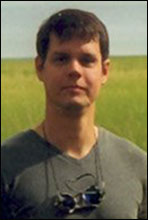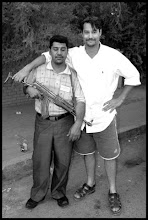 Ronald Allen Schulz, 40, an industrial electrician of Eagle River, Alaska and his Kurdish fiance, Susan Bushra, an interpreter for the U.S. Army, were kidnapped on November 25, 2005.
Ronald Allen Schulz, 40, an industrial electrician of Eagle River, Alaska and his Kurdish fiance, Susan Bushra, an interpreter for the U.S. Army, were kidnapped on November 25, 2005.
Insurgents released video footage of his execution, later viewed by family members. A presumption of death certificate was issued by a state judge in April 2006.
FBI: Remains of ND civilian recovered in Iraq
By James MacPherson, Associated Press, October 30, 2008
The remains of a North Dakota civilian taken hostage and killed in Iraq nearly three years ago have been recovered along with remains believed to be those of his fiancee, an interpreter for the military, his sister and FBI officials said.Schulz served in the U.S. Marine Corps 1984-1991. No mention if he served in Gulf War I.
Additional Reading
Extremist group claims it killed American hostage
AP, USA Today, December 19, 2005




